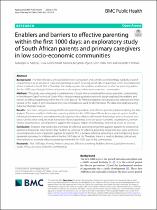Enablers and barriers to efective parenting within the frst 1000 days: an exploratory study of South African parents and primary caregivers in low socio-economic communities

View/
Date
2022Author
Adebiyi, Babatope O
Goldschmidt, Tessa
Benjamin, Fatiema
Sonn, Inge K
Metadata
Show full item recordAbstract
Background: The frst 1000 days is the period between conception and a child’s second birthday. Globally, research
on parenting is in an advanced stage, but parenting research focusing specifcally on parenting in this developmental
phase is limited in South Africa. Therefore, this study explores the enablers and barriers to efective parenting within
the frst 1000 days through the lens of parents and caregivers in low socio-economic communities.
Methods: This study was conducted in communities in South Africa considered low socio-economic communities
in the Western Cape Province of South Africa. An exploratory qualitative research design explored the enablers and
barriers to efective parenting within the frst 1000 days of life. Thirty participants were purposively selected and interviewed in this study. A semi-structured interview schedule was used for all interviews. The data were analysed using
inductive thematic analysis.
Results: Two main categories emerged (efective parenting enablers and efective parenting barriers) during the data
analysis. The main enablers of efective parenting within the frst 1000 days of life include a support system, healthy
behaviours/environment, unemployment/job opportunities, religion, information/knowledge, and professional assistance. On the other hand, the main barriers to efective parenting were low socio-economic circumstances, environmental circumstances, lack of partner’s support, the negative impact of technology, and lack of access to services.
Conclusion: Enablers that need to be promoted for efective parenting range from support systems to professional
assistance for parents. Also, barriers that need to be removed for efective parenting range from low socio-economic
circumstances to a lack of partner’s support for parents. This is because efective parenting is vital in improving developmental outcomes for children within the frst 1000 days of life. Therefore, there is a need to develop policies and
interventions to promote efective parenting within the frst 1000 days in the communities.
